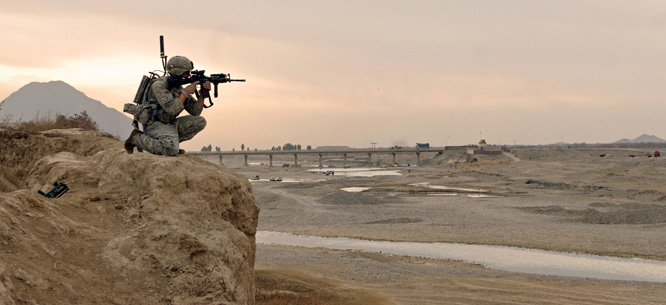Did the U.S. Really Break Iraq? Response to Michael Walzer
Did the U.S. Really Break Iraq? Response to Michael Walzer

To read Kathleen Cavanaugh’s original article, click here.
To read Michael Walzer’s response, click here.
In Michael Walzer’s reply to my piece on Iraq, he suggests that it reflects “how many leftists think about Iraq and other similar places” and goes on to critique me on three main points—first, the extent to which I weight the impact of U.S. actions in Iraq; second, the role of religion; and lastly, U.S. intervention and oil interests.
Drawing from my text, Walzer suggests that the fissures within Iraq predate the U.S. intervention and that, therefore, Iraq was “broken” long before 2003. There is no question that sectarian interests have been operating in Iraq since before the U.S. invasion. Iraqi politics, past and present, is replete with policies adopted by successive sovereign powers that have sought to use sectarianism as a means through which to exercise territorial control—policies that the Ba’athist regime systematically undertook when it was in power. However, as Eric Davis and other historians have pointed out, the sectarian violence witnessed today did not feature prominently in pre-Ba’athist Iraq. As Davis also argues, “The key task is not to identify the existence of sectarian feelings, but to explain why, at a particular point in time, such feelings are translated into violent behavior.” One should not imagine that what we are witnessing in Iraq today was inevitable—that, absent the strong leadership of Saddam Hussein, these long-held grievances would naturally bubble over. (Such a reading is reminiscent of 1980s U.S. foreign policy toward the Middle East, with its apprehension about the “Arab street,” which seems to be experiencing a renaissance of late.) Instead, the current violence reflects conditions—and structures—shaped by U.S. policy decisions, which fostered a new set of sectarian entrepreneurs operating under a new set of rules. These included Nouri al-Maliki, whose party (and not al-Maliki himself) was “democratically” elected.
Walzer’s second point is that I deliberately avoid citing religion as a factor. I do. I am, of course, aware that ISIS and other armed militias as well as repressive state actors often use religious discourse to justify their actions. Yet these violent and oppressive actions have little to do with religion per se. When we try to understand “Pakistan, Afghanistan, Syria,” etc.—in other words, Muslim societies—we must recognize, as Asef Bayat argues in Making Islam Democratic, that the “obstacles to democratic governance in Muslim societies have little to do with religion as such” but are underpinned by the “material and nonmaterial interests of those who hold [or want] power.”
As for U.S. oil interests, I think Walzer will agree that one of the weakest links in arguments related to a state’s “responsibility to protect” stems from the criteria of “right intent.” As states are not moral actors, and act in their own interests, one has to be aware of what those interests are (or may be). I do not think U.S. actions are solely vested in oil—they are also motivated by regional and larger security concerns—but I think it is necessary to flag both the timing of the U.S. decision to intervene and where those efforts have been focused.
This leaves one final point: the idea that my argument ticks a particular ideological (“leftist”) box. Walzer suggests that my understanding of Iraq, including my reluctance to foreground religion, puts me in line with a default “left” position. This kind of criticism reflects a strong current, both in the academy and outside (and particularly in the United States), where left and right are labels meant to inform everything that is understood after. I think that, if Walzer and I were to move our disagreements beyond such shorthand, he would find that my worldview reflects a rather more complex set of experiences.
My first visit to Iraq was in the summer of 2003. George W. Bush had just declared the “mission accomplished,” and although there was much confusion and uncertainty, it was a time of hope. The catastrophic decisions subsequently taken by U.S. administrators in Iraq—the abysmal failure to provide security, the de-Ba’athification policies, the appointment of Paul Bremer, the architecture of detention—did impact what happened then and continue to haunt what is happening in Iraq now. By the end of that summer, I saw the space that had been temporarily opened—where communities were beginning to cooperate and where the possibilities of something other than what had been left behind by successive repressive regimes—close. It is this experience and the years of contact since, more than any ideological framing, that inform my piece.
So does the burden of what is unfolding in Iraq today rest entirely on U.S. shoulders? No. I do not mean to offer a reductive account of a very complex political landscape—a morally corrupt space occupied by many other actors, both inside and outside Iraq. But did the United States promise something other than it delivered? Yes. And for that failure, Iraqis have paid a heavy price.
Kathleen Cavanaugh is a Lecturer of International Law in the Faculty of Law, Irish Centre for Human Rights (ICHR), National University of Ireland, Galway. Her most recent book, co-authored with Joshua Castellino, is Minority Rights in the Middle East (Oxford University Press, 2013).






